
Deaf West’s smash revisal of the Broadway musical hit Spring Awakening has transferred from its Fall 2014 run in the heart of Skid Row to glamorous Beverly Hills, one of the most noteworthy success stories of Los Angeles’s endangered 99-Seat Theatre Plan … and mark my words. You won’t see direction more brilliant nor a cast more gifted nor a production more awe-inspiring than the one now playing at the Wallis Annenberg Center For The Performing Arts.
For those of you who might be wondering how the First Professional Resident Sign Language Theater West Of The Mississippi could possibly put on a musical, let alone one as challenging as the 2007 Tony winner for Best Musical, Best Book, and Best Score, fear not. The ground-breaking Spring Awakening not only equals (and perhaps even surpasses) Deaf West’s previously re-imagined musicals Big River and Pippin, it may well follow the former’s example and be Broadway-bound as well.
Over a century before Steven Sater and Duncan Sheik adapted Frühlings Erwachen for the musical stage, Frank Wedenkind’s 1891 German-language drama had already broken plenty of ground with its depiction of on-and/or-offstage masturbation, child abuse, bondage, rape, abortion, and suicide among 14-year-olds just now awakening to their sexuality.
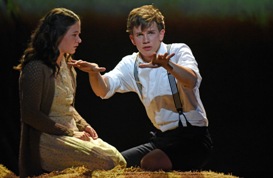 Sater and Sheik’s adaptation follows Wedekind’s basic plot threads. There are its two teen heroes, the handsome, popular, self-confident Melchior and his introverted, inhibited, wet-dream-plagued classmate Moritz, and its heroine, the all-too-innocent but no less sexually inquisitive girl-next-door Wendla, along with Melchior and Moritz’s ever-horny classmates and Wendla’s equally randy girlfriends.
Sater and Sheik’s adaptation follows Wedekind’s basic plot threads. There are its two teen heroes, the handsome, popular, self-confident Melchior and his introverted, inhibited, wet-dream-plagued classmate Moritz, and its heroine, the all-too-innocent but no less sexually inquisitive girl-next-door Wendla, along with Melchior and Moritz’s ever-horny classmates and Wendla’s equally randy girlfriends.
What made Spring Awakening work so brilliantly on Broadway was not just Sater’s streamlining of Wedekind’s melodramatic storylines but singer-songwriter-pop star Sheik’s catchy alternative rock score and Bill T. Jones’ brilliantly innovative choreography that together turned Spring Awakening into a mainstream (and cult) international phenomenon, one that Deaf West now takes a step further.
The Sign Language Theater’s process with straight plays like 2005’s Open Window (staged at the Pasadena Playhouse) has been a fairly simple one. Deaf actors sign dialog while hearing actors translate simultaneously—and unobtrusively—into spoken words.
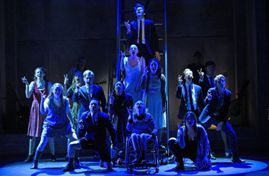 Deaf West musicals take this approach several steps further, dividing roles about half-and-half between hearing performers (who speak and sing while simultaneously signing dialog and lyrics) and deaf or hearing-impaired actors who sign as their hearing doubles provide spoken and sung words.
Deaf West musicals take this approach several steps further, dividing roles about half-and-half between hearing performers (who speak and sing while simultaneously signing dialog and lyrics) and deaf or hearing-impaired actors who sign as their hearing doubles provide spoken and sung words.
Perhaps more than any previous Deaf West production, Spring Awakening has its deaf performers and their hearing counterparts literally sharing roles, and though the focus remains on the shared roles’ deaf actors, the speaking-singing “other halves” have considerably more to do now than simply serving as shadows, whether it be acting/reacting in tandem with their non-speaking/singing counterparts or serving as their inner voice/conscience or simply being part of each character’s human complexities.
Having all but one of the production’s seven speaking/singing “other-halves” double as members of Spring Awakening’s ten-piece band adds extra spice to the savory mix, a guitar-playing Katie Boeck shadowing Sandra Mae Frank’s Wendla, Alex Boniello not only strumming guitar chords but giving Daniel N. Durant his rocker’s voice, and Daniel David Stewart’s onstage piano providing accompaniment as Stewart speaks and sings for Joshua Castille’s Ernst, to cite just three examples.
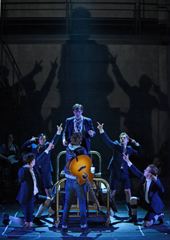 A review can only begin to highlight the multitude of inspired touches that Broadway star Arden (Tom Sawyer in Deaf West’s Big River and the speaking/singing half of Pippin) brings to Spring Awakening as its director.
A review can only begin to highlight the multitude of inspired touches that Broadway star Arden (Tom Sawyer in Deaf West’s Big River and the speaking/singing half of Pippin) brings to Spring Awakening as its director.
Breaking at times from Deaf West speaking-signing tradition, Arden opts to title certain sequences, most notably in the schoolboys’ Latin class and, in one particularly striking instance, by having a scene between two deaf actors play out in complete silence, their conversation projected for audience members not familiar with ASL. And when Arden has a deaf cast member speak one of the musical’s most devastating lines in a voice we have heretofore not heard, it becomes even more devastating.
A number of signature Spring Awakening moments benefit from Arden’s prodigious imagination, as when one character’s “self-pleasuring” gets aided and abetted by the schoolgirls who not only feed his fantasy but sign his words, thereby freeing his own hands for (excuse the pun) the task at hand. There’s even a clever nod to the Broadway original’s ubiquitous hand mikes in Melchior’s “Totally Fucked.”
Spencer Liff’s choreography once again integrates ASL and dance to stunning effect, without ever imitating Bill T. Jones’ now signature Tony-winning moves, making this Spring Awakening’s “The Bitch Of Living” and “Totally Fucked” every bit the showstoppers they’ve been in productions past … and but with distinctive twists and turns.
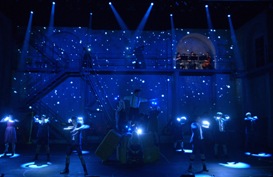 Rest assured that what Arden and a fresh new design team are giving Wallis audiences is no carbon copy of what 99-seaters saw at Inner-City Arts last year, but an ingeniously tweaked upscaling that proves Arden’s vision every bit as effective on a Broadway-sized stage as it was in its smaller-scale intimate incarnation.
Rest assured that what Arden and a fresh new design team are giving Wallis audiences is no carbon copy of what 99-seaters saw at Inner-City Arts last year, but an ingeniously tweaked upscaling that proves Arden’s vision every bit as effective on a Broadway-sized stage as it was in its smaller-scale intimate incarnation.
Almost the entire original Los Angeles cast has returned for the Wallis run, with a couple of high-profile newbies adding a bit of Broadway/TV star power to the ensemble.
An even stronger Austin McKenzie once again gives Melchior a sweetness and innocence that turn the town’s seductive “teen idol” into someone considerably more sympathetic and complex, and the Arizona native, who looks scarcely out of his teens, both sings and signs to perfection (having already learned ASL before being cast).
Andy Mientus, who played the seductive, sexually fluid Hanschen over 600 times in Spring Awakening’s First National Tour, is a stunning cast addition as is Original Broadway Cast member Krysta Rodriguez, a powerful singer whose striking reinvention of teen runaway Isle reveals a deeply troubled sexual abuse victim just barely holding it together. (Like Mientus, Broadway star Rodriguez’s presence in the class ought to bring in NBC’s Smash fans in droves.)
Fellow newbie (and Broadway vet) Alex Wyse is a nerdily handsome Georg and like Glee’s Ali Stroker, he sings quite terrifically. (Having cast returnee Stroker play Anna from her own wheelchair adds diversity to an already diverse mix.)
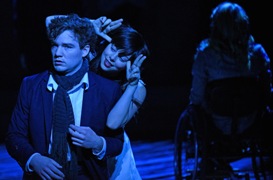 Shared performances are equally memorable.
Shared performances are equally memorable.
Frank’s even more wondrous Wendla reveals so much with her face and hands, you scarcely feel the need for a vocal counterpart, though Boeck fills this role to pure, crystal-clear perfection, and the synergy between the two is as synergistic as it gets.
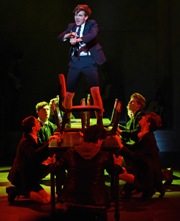 As he did this past fall, Durant commands the stage as the testosterone-tormented Moritz, and charismatic, gorgeously-voiced cast addition Boniello could not make for a finer mirror opposite, revealing an inner self urging Moritz to break through layers of repression if only he could.
As he did this past fall, Durant commands the stage as the testosterone-tormented Moritz, and charismatic, gorgeously-voiced cast addition Boniello could not make for a finer mirror opposite, revealing an inner self urging Moritz to break through layers of repression if only he could.
Both Miles Barbee and his musician-vocal counterpart Sean Grandillo are charisma-blessed as well, their blend of talents once again making the very most of the most underwritten of the boys.
Those who loved Spring Awakening in 99-seat-plan form will be pleased to rediscover Treshelle Edmond’s touching work as the physically abused Martha, with a guitar-playing Kathryn Gallagher again giving Martha stunning voice in “The Dark I Know Well.”
The lovely Amelia Hensley and her vocal counterpart Lauren M. Luiz (who joined Spring Awakening 1.0 late in its original run) are such a splendid match, you scarcely know where one ends and the other begins.
Last but not least among the teen protagonists is returnee Castille’s star turn as a heartbreakingly vulnerable Ernst, with triple-Scenie-winner Stewart giving him achingly beautiful voice (and providing expert piano accompaniment throughout).
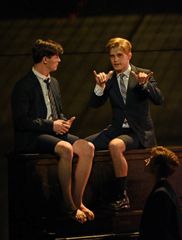 As for the Ernst and Hanschen’s same-sex eleventh-hour “The Word Of Your Body” reprise, Castille and Mientus play it better than I’ve ever seen it played before, capturing both the humor and the heart of the adolescent gay love scene without a hint of the “let’s laugh at the gays” undertone it’s had before.
As for the Ernst and Hanschen’s same-sex eleventh-hour “The Word Of Your Body” reprise, Castille and Mientus play it better than I’ve ever seen it played before, capturing both the humor and the heart of the adolescent gay love scene without a hint of the “let’s laugh at the gays” undertone it’s had before.
Daniel Marmion and Natacha Roi make noteworthy returns as the speaking halves of Spring Awakening’s varied cast of adult parents-and-others and are joined this time by deaf counterparts Howie Seago and Hillary Baack. (Adding Baack’s second deaf adult gives a better sense of balance, in addition to helping to clarify just who is who among the grownups.)
Jared Stein again merits top marks as music director with onstage cast members Sean Barna (drums), Boeck, Boniello, Gallagher, Grandillo (bass), Stewart, and the incandescent Alexandra Winter (harp) doubling as Spring Awakening’s sensational onstage band, Christian Hebel (violin), Tim Loo (cello), and Diana Wade (viola) adding their own instrumentals from high above.
New to Spring Awakening 2.0 is almost all of the production design team.
Scenic designer Dane Laffrey’s dual-level factory-gray set takes on multiple looks thanks to Lucy MacKinnon’s often breathtaking projections, and features an ingenious use of a ladder-staircase-on-wheels. The combination of period straight-back chairs and their modern equivalents is another smart touch, as is having cast members entwined to create an enchanted oak, and Laffrey’s reconceived set makes the production’s finale perhaps even more breathtaking than it was before. (Did I mention the inspired use of the Bram Goldsmith Theatre’s hydraulically propelled orchestra pit?)
Laffrey and associate costume designer Christopher Scott Murillo outfit the cast with just the right retro-modern look as does returning hair-and-wig designer Carol Doran.
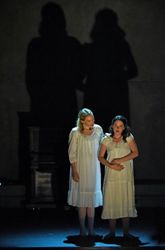 Ben Stanton’s lighting is vibrant, varied, and evocative. Co-sound designers Brian Hsieh and John Nobori insure a clear mix of vocals and instrumentals.
Ben Stanton’s lighting is vibrant, varied, and evocative. Co-sound designers Brian Hsieh and John Nobori insure a clear mix of vocals and instrumentals.
ASL masters Elizabeth Greene, Anthony Natale, and Shoshannah Stern have returned for the Wallis transfer, the better to ensure that hearing actors, regardless of signing ability when cast, come out looking to this reviewer’s admittedly unpracticed eyes, quite fluent indeed. Linda Bove is ASL consultant.
Blake Silver returns as associate director and Alexandria Wailes is associate choreographer.
Roles have again been cast (almost entirely with L.A.-based performers) by Beth Lipari and Bruce Newberg, including returning swings Joey Antonio, Julian Comeau, Gabrielle Garza, and Katie Gutierrez.
TJ Kearney is production stage manager and Susie Walsh assistant stage manager.
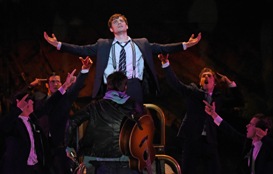 Spring Awakening is presented by the Wallis Annenberg Center For The Performing Arts and Deaf West Theatre and Cody Lassen with Ken Davenport and John C. Hall. It is produced by Lassen and Christopher Sepulveda. Its concept was developed for Deaf West Theatre by Arden and Mientus.
Spring Awakening is presented by the Wallis Annenberg Center For The Performing Arts and Deaf West Theatre and Cody Lassen with Ken Davenport and John C. Hall. It is produced by Lassen and Christopher Sepulveda. Its concept was developed for Deaf West Theatre by Arden and Mientus.
I wrote back in December that of the dozen Spring Awakening’s I’d seen, “there has never been one more uniquely brilliant than Deaf West’s,” a statement that holds even truer at the Wallis Annenberg Center For The Performing Arts.
When (and not if) Deaf West Spring Awakening makes its L.A.-to-Broadway transfer, you can mark my words. It will be the musical to beat for the coveted Best Revival Tony … and more.
Michael Arden et al. You might as well start preparing your acceptance speeches today.
Bram Goldsmith Theater, Wallis Annenberg Center for the Performing Arts, 9390 N. Santa Monica Blvd, Beverly Hills.
www.thewallis.org
–Steven Stanley
May 28, 2105
Photos: Kevin Parry
Tags: Andy Mientus, Duncan ShEIk, Krysta Rodriguez, Los Angeles Theater Review, Michael Arden, Steven Sater, Wallis Annenberg Center For The Performing Arts



 Since 2007, Steven Stanley's StageSceneLA.com has spotlighted the best in Southern California theater via reviews, interviews, and its annual StageSceneLA Scenies.
Since 2007, Steven Stanley's StageSceneLA.com has spotlighted the best in Southern California theater via reviews, interviews, and its annual StageSceneLA Scenies.







 COPYRIGHT 2025 STEVEN STANLEY :: DESIGN BY
COPYRIGHT 2025 STEVEN STANLEY :: DESIGN BY